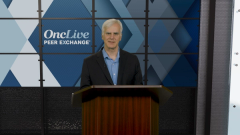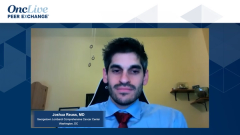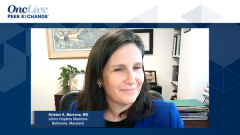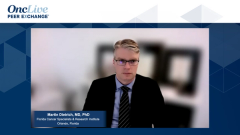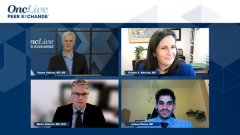
Advanced NSCLC: Interpreting Data From the POSEIDON Trial
A brief review of the POSEIDON trial, which analyzed durvalumab with or without tremelimumab in combination with chemotherapy in advanced NSCLC.
Episodes in this series

Transcript:
Balazs Halmos, MD, MS: Josh, tell us how the POSEIDON regimen is designed. How was it designed? It’s 4 cycles of chemotherapy plus durvalumab-tremelimumab and fifth dose of tremelimumab.
Joshua Reuss, MD: POSEIDON was a large phase 3 randomized clinical trial that enrolled patients with stage IV non–small cell lung cancer who were treatment naïve. Patients without EGFR or ALK alterations were stratified by PD-L1 expression. PD-L1 high is defined by tumor cell expression of 50% or greater vs less than 50%. Stratified by disease stage and histology, these patients were randomized 1 to 1 receive 1 of 3 regimens. The standard of care was histology-specific chemotherapy followed by pemetrexed maintenance in those with adenocarcinoma histology. Patients also receive durvalumab-tremelimumab plus histology-specific chemotherapy for 4 cycles, followed by 1 cycle of durvalumab with tremelimumab only, followed by durvalumab maintenance. Pemetrexed was given at this setting as well for those with adenocarcinoma. The final arm received durvalumab plus histology-specific chemotherapy, followed by durvalumab maintenance with pemetrexed. The primary end point was progression-free survival in those with durvalumab-chemotherapy vs chemotherapy, with overall survival as a co-primary end point.
This was a positive study for durvalumab-tremelimumab-chemotherapy vs chemotherapy alone. There were some intriguing subgroups. We’ve all been talking about CTLA4, which looks important in those [with squamous cell carcinoma], particularly those who are PD-L1 negative. You didn’t see that same signal in POSEIDON. That threw a wrench into that theory, or least we want more data there.
But in that subgroup of KRAS/STK11 or KRAS/KEAP1, there appears to be a benefit in response and durability of response. This woman showed a more durable response to the durvalumab-tremelimumab-chemotherapy. It’s intriguing, and it’s something I’d consider for a patient who’s fit. Maybe this is the right approach for them. Should we utilize this small subgroup data and utilize that to make broad treatment decisions? That’s open to debate. It’s something I’m going to be debating at the D.C. Lung Cancer Conference in October.
Transcript edited for clarity.


